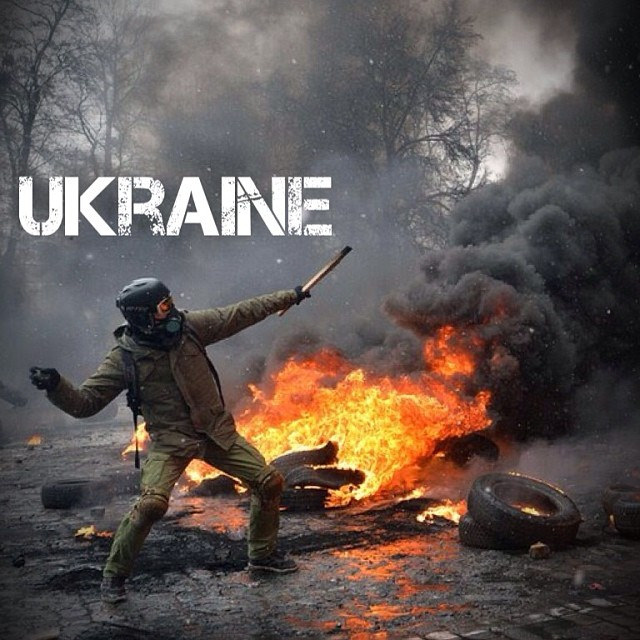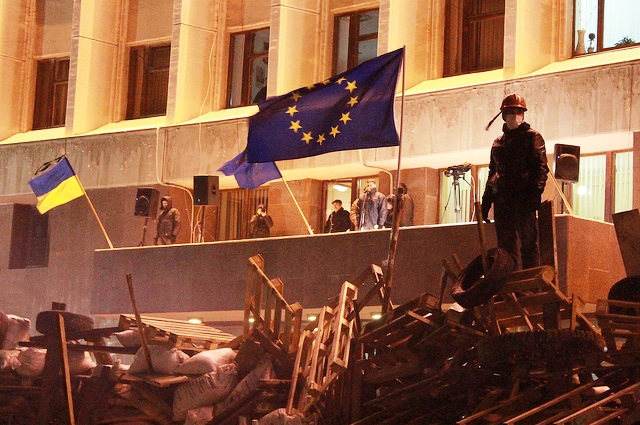Ayanna Nahmias, Editor-in-ChiefLast Modified: 00:35 a.m. EDT, 20 February 2014
 KIEV, Ukraine - Protesters who had been barricaded in the city’s trade union building which they were using as an operation base, remain steadfast in their cause, despite security forces deadly attack against them. Casualties have ensued on both sides as Tuesday at least 11 demonstrators and seven police officers were killed in the ensuing confrontations.
KIEV, Ukraine - Protesters who had been barricaded in the city’s trade union building which they were using as an operation base, remain steadfast in their cause, despite security forces deadly attack against them. Casualties have ensued on both sides as Tuesday at least 11 demonstrators and seven police officers were killed in the ensuing confrontations.
Security forces are reported to have set fire to the building, with the intent of forcing protest leaders out into the open where snipers could have a clear shot. According to The Independent, “opposition leader Aleksandr Turchinov was among those said to have been shot as he stood on the stage, but it was unclear how seriously he was hurt.”
Despite mounting pressure and international condemnation of the suppressive measures instituted by President Viktor Yanukovych, both sides remain resolute in their positions, as fires back-light the historic city of Kiev, and the epicenter of the violence – Independence Square, also known as the Maidan.
The opposition leaders are at least open to talks, and even U.S. Vice President Joe Biden acknowledged that the protestors have “legitimate grievances” which need to be addressed. According to The Independent, Biden called Ukraine’s President Viktor Yanukovych and urged him to meet with and seriously consider the proposals for political reform that would lead to an end of the violence.
At issue is Ukraine’s potential return to Soviet governance, if not in fact, then as a political and economic expediency. Ukraine gained its freedom as an autonomous nation on 16 July 1990, when its’ parliament adopted “the Declaration of State Sovereignty of Ukraine. The declaration established the principles of the self-determination of the Ukrainian nation, its democracy, political and economic independence, and the priority of Ukrainian law on the Ukrainian territory over Soviet law. (Source: Wikipedia)
With the global economic meltdown, Ukraine, like many other countries suffered severe financial instability which required large amounts of capital infusion to keep the government solvent. Two solutions were on the table, and to the chagrin and amazement of the citizenry, President Yanukovych spurned a historic trade and political agreement with European Union in favor of a £9bn financial bailout from Russia.
1 2 Next Page »
Published: 20 February 2014
(Page 2 of 2)
His decision effectively halted Ukraine’s steady march toward modernity and democracy, in favor of a return to the autocracy of the past. In response to his decision, and despite freezing temperatures, Ukrainians took to the streets in peaceful protest, but after nearly 5-months of silence from the government, peaceful demonstrations turned violent as frustrations grew with Yanukovych’s refusal to meet with opposition leaders or even discuss alternative solutions to solve the country’s financial problems.
The clashes ensued on Monday the 17th following an announcement that Russia's Finance Minister offered to deliver additional bailout funds to Ukraine, sparking fears that the move could pave the way for a Moscow loyalist as the new prime minister. (Source: The Independent)
The two opposition leaders - Vitali Klitschko and Arseniy Yatsenyuk, were finally called to the President’s office for talks, but it is clear that both parties are on extreme ends of the spectrum with regard to a solution to cease the violence. Klitschko and Yatsenyuk are calling for President Yanukovych to resign and call early elections in advance of 2015 election cycle.
President Yanukovych remains defiant and has yet to publicly outline a plan to address the Ukrainian citizenry’s concern about the erosion of their civil rights. Nor has he openly admitted the high probability of the loss of Ukrainian autonomy should his government become deeply in debt and dependent upon the financial largess of Moscow. However, as of a few hours ago, a truce has been called and rioting has ceased as each side tries to stem the tide of violence.
It remains to be seen whether this ceasefire will last, but the issue of getting into bed once again with Russia is critical, though it will probably not be resolved during this first round of negotiations. Regarding Moscow, Yanukovych would do well to remember the following adages - relationships are like glass, sometimes its better to leave them broken, because when you try to pick up the pieces you always end up getting hurt; and if you bite the hand that feeds you punishment is sure to follow.
Return to Page 1 »
Follow Nahmias Cipher Report on Twitter
Twitter: @nahmias_report
Editor-in-Chief: @ayannanahmias
 In an effort to avoid government regulation and intervention, digital currencies have been created in the last few years and have seen some successes.
In an effort to avoid government regulation and intervention, digital currencies have been created in the last few years and have seen some successes.


















